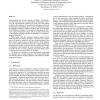Free Online Productivity Tools
i2Speak
i2Symbol
i2OCR
iTex2Img
iWeb2Print
iWeb2Shot
i2Type
iPdf2Split
iPdf2Merge
i2Bopomofo
i2Arabic
i2Style
i2Image
i2PDF
iLatex2Rtf
Sci2ools
117
click to vote
SIGSOFT
1998
ACM
1998
ACM
Effective Whole-Program Analysis in the Presence of Pointers
Understanding large software systems is difficult. Traditionally, automated tools are used to assist program understanding. However, the representations constructed by these tools often require prohibitive time and space. Demand-driven techniques can be used to reduce these requirements. However, the use of pointers in modern languages introduces additional problems that do not integrate well with these techniques. We present new techniques for effectively coping with pointers in large software systems written in the C programming language and use our techniques to implement a program slicing tool. First, we use a fast, flow-insensitive, points-to analysis before traditional data-flow analysis. Second, we allow the user to parameterize the points-to analysis so that the resulting program slices more closely match the actual program behavior. Such information cannot easily be obtained by the tool or might otherwise be deemed unsafe. Finally, we present data-flow equations for deali...
| Added | 05 Aug 2010 |
| Updated | 05 Aug 2010 |
| Type | Conference |
| Year | 1998 |
| Where | SIGSOFT |
| Authors | Darren C. Atkinson, William G. Griswold |
Comments (0)

